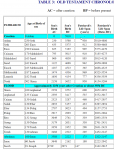As I continue my journey through this remarkable book, I love the mystery surrounding the authorship and composition date.
As a Christian literary scholar, the Book of Job is in the same realm of the great classics of ancient literature, and I would argue it is at the top of the list with the rest of the Old Testament because it is God's Word and revelation to humanity. The Bible is the most important literary gift God has blessed us with by far.
Hardcore scholars have a tough time pinning The Book of Job down to an agreed upon date. The best guess they can somewhat agree upon is somewhere between the 2nd and 7th centuries B.C. According to Halley's Bible Handbook, "Ancient Jewish tradition ascribed the book to Moses." Wow, that would double the date estimated by scholars! I really like Halley's conclusion on the matter: "Modern Critics assign a much later date to the book of Job [than the time of Moses], but in the end it is the content of the book that is important, not our speculative guesses about its origins." Sorry Mr. Halley, I do have to speculate a little (fun to do so, but not a matter of salvation of course... ).
).
The idea of the character of Job being an ancient story about an actual person that dates back to Moses or even earlier is intriguing. I also find merits in the actual written composition of the story taking place in that 2nd-7th century period due to the sophistication of the poetry/prose. It reminds me so much of reading the great classical dramas and poetry of that era.
In the midst of Job's deepest sorrows and suffering, the level of faith and prophetic insight he expresses is incredible. The author(s) appear to have had access and inspiration to a vast theological and literary library that implies to me having at the minimum the law, the prophets, and most of the writings composed in the Old Testament. The prose/poetry has a level of sophistication that reminds me of the Greek golden era of the classics (~300 B.C.).
The verse below is a great example and one of the best known and quoted from this book:
For I Know that my Redeemer lives, And He shall stand at last on the earth;
And after my skin is destroyed, this I know, That in my flesh I shall see God. (Job 19: 25-26)
This is a blaring reference to Christ's return and the resurrection of the dead, which the prophets and psalmists are only given glimpses of in Old Testament times. The Book of Ezekiel (~565 - 593 B.C.) gives a concrete description of a resurrection (see Ezekiel 37 as an example). The Book of Job wrestles with Old Testament teachings as a whole to glean new insights into our relationship with God, and it nicely sets the stage for New Testament teachings based on the solid foundation of our Rock, Jesus Christ!
As a Christian literary scholar, the Book of Job is in the same realm of the great classics of ancient literature, and I would argue it is at the top of the list with the rest of the Old Testament because it is God's Word and revelation to humanity. The Bible is the most important literary gift God has blessed us with by far.
Hardcore scholars have a tough time pinning The Book of Job down to an agreed upon date. The best guess they can somewhat agree upon is somewhere between the 2nd and 7th centuries B.C. According to Halley's Bible Handbook, "Ancient Jewish tradition ascribed the book to Moses." Wow, that would double the date estimated by scholars! I really like Halley's conclusion on the matter: "Modern Critics assign a much later date to the book of Job [than the time of Moses], but in the end it is the content of the book that is important, not our speculative guesses about its origins." Sorry Mr. Halley, I do have to speculate a little (fun to do so, but not a matter of salvation of course...
The idea of the character of Job being an ancient story about an actual person that dates back to Moses or even earlier is intriguing. I also find merits in the actual written composition of the story taking place in that 2nd-7th century period due to the sophistication of the poetry/prose. It reminds me so much of reading the great classical dramas and poetry of that era.
In the midst of Job's deepest sorrows and suffering, the level of faith and prophetic insight he expresses is incredible. The author(s) appear to have had access and inspiration to a vast theological and literary library that implies to me having at the minimum the law, the prophets, and most of the writings composed in the Old Testament. The prose/poetry has a level of sophistication that reminds me of the Greek golden era of the classics (~300 B.C.).
The verse below is a great example and one of the best known and quoted from this book:
For I Know that my Redeemer lives, And He shall stand at last on the earth;
And after my skin is destroyed, this I know, That in my flesh I shall see God. (Job 19: 25-26)
This is a blaring reference to Christ's return and the resurrection of the dead, which the prophets and psalmists are only given glimpses of in Old Testament times. The Book of Ezekiel (~565 - 593 B.C.) gives a concrete description of a resurrection (see Ezekiel 37 as an example). The Book of Job wrestles with Old Testament teachings as a whole to glean new insights into our relationship with God, and it nicely sets the stage for New Testament teachings based on the solid foundation of our Rock, Jesus Christ!
-
4
-
1
-
1
-
1
- Show all


